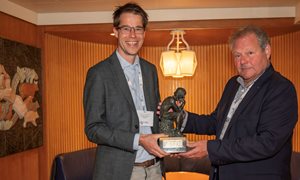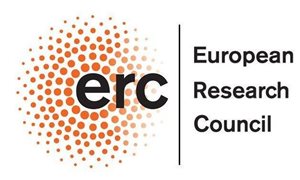
Cathrin Gräwe and Michiel Vermeulen, theme Cancer development and immune defense, together with the Schübeler and Thomä labs at the FMI in Basel, Switzerland, identified a long-sought-after transcription factor that regulates essential genes in the mouse and human genome. The study is published in Nature.
Proteins known as transcription factors control the expression of genes by binding to specific DNA sequences, referred to as motifs. Many motifs and their associated transcription factors have been extensively studied. However, for some motifs that control essential genes, the associated transcription factors are unknown. One of these motifs, the CGCG element, was characterized by the Schübeler lab using single-molecule footprinting. DNA affinity purifications followed by mass spectrometry led to the identification of the Btg3-associated nuclear protein (BANP) as the transcription factor that interacts with this motif with a very high affinity.
Further characterization of this protein, which was previously thought to repress genes at the periphery of the nucleus, showed that it is a potent activator of essential genes. Upon binding to its motif in the genome, BANP opens up chromatin and activates transcription. Due to its essential role in regulating expression of essential genes, cells die upon depletion of BANP. This might be the reason that BANP and its important function as a transcription factor has previously been overlooked. Future studies investigating BANP and other essential transcription factors will provide more insights in how genes are regulated, which will eventually lead to a better understanding of cellular homeostasis as well as perturbations thereof that result in disease.
Michiel Vermeulen works at the Faculty of Science of Radboud University and is part of the interfaculty research institute RIMLS.
Related news items

T cell immunity is directed by tetraspanin CD53
5 July 2022 T cells are immune cells that are key for the defense against pathogens and cancer. T cells depend on the membrane protein CD45 to initiate T cell receptor signaling, but how CD45 is controlled at the molecular level is poorly understood. go to page
A single protein complex balances the very first lineage decision of cells in human: towards foetus or placenta
21 June 2022 The international group of researchers spearheaded by Dick Zijlmans and Hendrik Marks together with colleagues from KU Leuven, examined which proteins are associated with the chromatin and how this affects gene transcription. go to page
Dutch Society of Clinical Chemistry Science & Innovation Award for the team of Hans Jacobs
14 June 2022 The team of Hans Jacobs pioneers on the development of personalized diagnostics to measure minimal residual disease in patients with multiple myeloma. go to page
European grants for groundbreaking Radboudumc research Professors Roshan Cools and Peter Friedl receive ERC Advanced Grant
26 April 2022The European Research Council (ERC) is awarding grants to Roshan Cools and Peter Friedl, both professors at Radboudumc. While Cools will investigate how brains control behaviour in (stressful) situations, Friedl will work on developing a new cancer therapy.
go to page
Saponin-based adjuvant-induced dendritic cell cross-presentation is dependent on PERK activation published in Cellular and Molecular Life Sciences
20 April 2022 Lisa Huis in ‘t Veld, Nataschja Ho and colleagues from the team of Gosse Adema published in Cellular and Molecular Life Sciences that Saponin-based adjuvant-induced dendritic cell cross-presentation is dependent on PERK activation. go to page
Rubicon grants awarded to three RIMLS researchers
19 April 2022Three researchers have received Rubicon funding from NWO/ZonMw. This will enable Elke Muntjewerff, Laura de Vries and Laurens van de Wiel to do research at a foreign research institute for the next two years.
go to page